Heidi Chiavaroli's Blog, page 8
July 31, 2018
Road Trippin’ with Tyndale and Jolina Petersheim: Stop #3
Welcome to Tyndale Fiction’s Road Trip Scavenger Hunt! We’re so happy you are here. To participate, collect the key words through all 13 stops in order, so you can enter to win our grand prize giveaway!
Some details:
~ The adventure begins on Wednesday, August 1. You’ll have two weeks to make your way through all the stops (giveaways will close on Tuesday, August 14).
~ While you do not have to start at Stop #1, keep in mind that the grand prize giveaway phrase will begin with the word you collect at that first stop.
~ To complete your submission for the grand prize giveaway, be sure to collect the key word within each author’s blog post, submitting the final, completed phrase in the form hosted on this page.
~ Also, be sure to enter the giveaways these authors are hosting on their blogs!
Enjoy the journey—we hope you’ll discover new books along the way as you hear from Tyndale Fiction authors about road trips, the settings of their novels, and more!
Happy road tripping!
-----------
I’m super excited to be hosting the sweet and talented Jolina Petersheim on my blog today. Jolina’s bestselling debut, The Outcast, was a modern retelling of The Scarlet Letter set in a Mennonite community. Four books later, Jolina is still capturing readers with her unique slant on the genre. Her last book, The Divide, just won an INSPY Award in the speculative fiction category. (You read that right—Mennonite setting, speculative fiction category!)
I loved Jolina’s story of a road trip that eventually led to her own love story and can’t wait to share it with you. Welcome, Jolina!

------------
My love story began with a story. Or I guess you could say it began with a trip.
When I was fifteen, my parents, my younger brother, and my best friend Misty went out West for three weeks. But my dad wanted to make a “detour” at Strawberry Lake Christian Retreat in Minnesota to visit a pastor named Gerald Derstine. Gerald’s daughter, Joanne, had written a non-fiction book called Following the Fire, which recounted the revival that had taken place among the small Mennonite congregation her father led. My dad, raised Mennonite and with a heart for revival, had been impacted by this book while visiting relatives in Pennsylvania.
I was fifteen when we took this trip. Therefore, I was old enough to know that Minnesota was not “out West” but, unfortunately, I was not too old to sulk. I still remember that day at Strawberry Lake. I was bored, so I checked out the bookstore while my dad tried to locate Gerald. I purchased a book and then walked the grounds. I walked past a row of offices, and one of the doors stood open. A white-haired man was writing over a square, wooden desk. In my mind, I can see him clearly, but I more clearly recall that only natural light filled the room.
I asked, “Are you Gerald Derstine?”
He told me he was, so I told him my dad was looking for him.
My dad and Gerald spoke that afternoon, and my dad spoke at their church gathering that night. I didn’t want my dad to speak. I wanted to go “out West.” I wanted turquoise, cacti, and—being slightly boy crazy—cowboys.
However, little did I know, as I complained to my best friend while swatting mosquitoes on a dock, that this detour would redirect the course of my life.
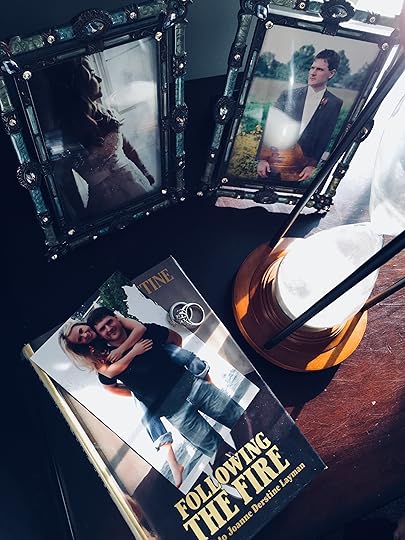
One of the main characters in Following the Fire, Amos Stoltzfus, an ex-Amish father and grandfather who lived in Winchester, Tennessee, lived a few hours south from where I grew up. So, when we returned from “out West,” my dad called Amos. They spoke on the phone for close to an hour, and Amos asked us to come visit the church he attended, pastored by his son.
My parents went first, and I visited a few weeks later. Turns out, Amos Stoltzfus had a large, bustling family. He also had a handsome grandson, named Randy Petersheim. Randy was twenty-two when we met, and I was a few weeks shy of sixteen. But I was not shy. After talking to Randy (I loved his Pennsylvania Dutch accent!), I decided I would hook this quiet mountain man up with my nineteen-year-old best friend, Misty, since their age-range made more sense.
But that next summer, on the fourth of July, sense didn’t come into it.
I brought Misty down to meet Randy—talking him up the whole way there—but as soon as he crossed the church grounds over to where we were, I knew that I’d talked him up so much because I really wanted him for myself. I wasn’t brave enough to break the news until later that night, when Misty and I were sprawled across a trampoline in Randy’s parents’ front yard, and being the kind of long-suffering best friend/big sister she is, she forgave me. And then she forgave me again when we went hiking the next day, and I left her at the bottom of the mountain with my older brother because I didn’t want to lose sight of Randy.
(Did I mention I dedicated my debut novel, The Outcast, to Misty? I figured I owed her.)
Sometimes, life’s best destinations are found in the detours. If my dad hadn’t insisted on visiting Strawberry Lake, I would’ve never met Gerald Derstine, who introduced us to Amos Stoltzfus, who introduced us to Richard and Betty Petersheim, who introduced us to Randy Petersheim, my husband to-be. Through the Petersheims, I learned the story that would become the basis for The Outcast, my modern retelling of The Scarlet Letter set in a Mennonite community in Tennessee.
Proverbs 16:9 states that we can make our plans, but God determines our steps. I don’t know about you, but I am grateful for the divine detours along the way!
Has God ever led you on a “divine detour”? How did it change your life?
------------------
Beautiful story! Thank you for sharing, Jolina!
Here’s the Stop #3 Important Information:
You can purchase Jolina’s book, The Midwife, here.
Clue to write down: life-changing
Link to Stop #4, the next stop in the scavenger hunt, on Jolina’s Site !
------------------
Heidi's Giveaway
But wait! Before you go, I'm giving away a signed copy of each of my novels, a beautiful American flag scarf, and a Massachusetts notepad! To enter, simply sign up to receive my quarterly e-newsletter here, or note in the comments if you are already a subscriber.
I will reveal the winner on August 15th! (Due to shipping costs, giveaway is for US residents only.)
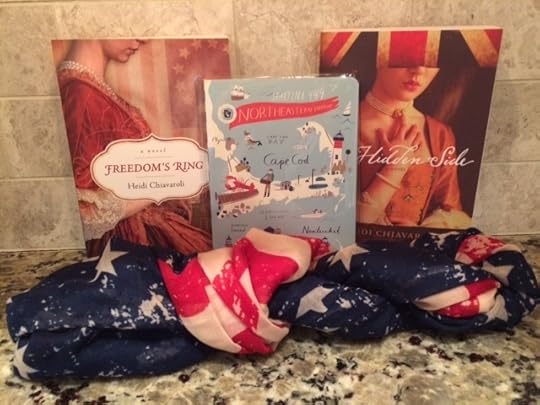
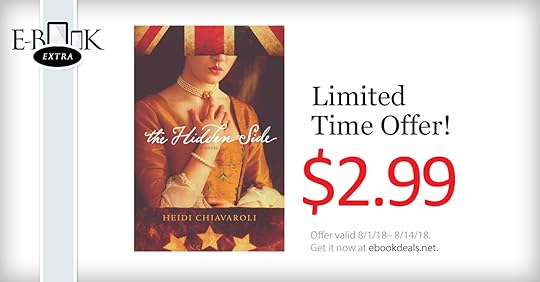
And for you e-reading folks who love a great deal, The Hidden Side is on sale for a limited time for only $2.99!
Happy hunting, and happy reading!
Subscribe to my RSS feed

Share this post
July 17, 2018
Who Was Agent 355?
Agent 355 plays a major role in my novel, The Hidden Side, but who was she besides an elusive and mysterious historical person?
“355” was simply the Culper code name for “lady.” She is mentioned only once in correspondence written by Abraham Woodhull, referred to as the certain lady “who will outwit them all.”
That statement alone hints at how important she was to the Revolutionary cause, and yet, centuries later, we still don’t know for certain who she is. In his book, Washington’s Spies, Alexander Rose states his belief that 355 was Anna Smith Strong, yet we don’t seem to have any certain proof to back up that assertion.
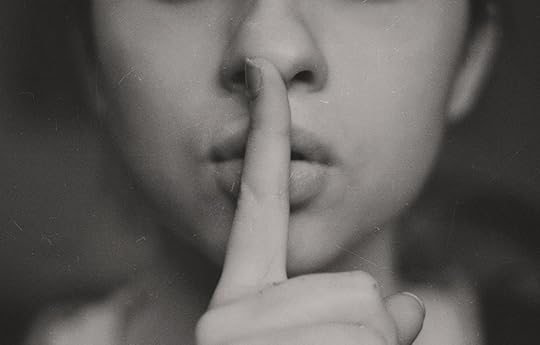
In his book, George Washington’s Secret Six, Brian Kilmeade outlines the identities of seven possible women who could have taken up the role. It seems that, unless history turns up new evidence, her real identity may always remain a mystery.
What we do know is Agent 355 was a brave woman. She risked much—perhaps even her life—for the sake of our country’s freedom.
I have to admit that it was fun to build a fictional character around Agent 355. Because we’re not sure of her identity, I was given freedom to create Mercy Howard. Mercy is a friend and neighbor of Abraham Woodhull. And while she feels conflicted in living a life of deceit, after watching her fiancé hung as a spy and realizing that her uncle betrayed the Patriots, Mercy takes matters into her own hands by aiding General Washington’s most famous spy ring.
What is it about Agent 355 that we find so intriguing? No doubt we’re fascinated by the mystery of her. The danger, the secrets. But more than that, we are drawn to her courage--her willingness to risk so much for that which she believed.
This post uses Affiliate Links. We are a participant in the Amazon Associates Program. Thank you for using our links!
Subscribe to my RSS feed

Share this post
July 4, 2018
1/2 Off For The 4th! (And Some Exciting Award News!)

Happy Independence Day!
As we celebrate the 242nd Anniversary of our country's birth, I hope your day is filled with cookouts and parades, fireworks, family, friends, and maybe...books!
To help celebrate the Fourth, my publisher is offering a super special deal—50% off both Freedom's Ring AND The Hidden Side!
Simply visit Tyndale.com and use code freedom50 when checking out. If you're too busy with fun festivities today, no worries—this deal is good through July 11th.
If you'd like to read some of my thoughts on faith, freedom, and country, I invite you to visit here.
I am so incredibly thankful for you, my readers. Writing is hard work, but it's also a lot of fun, and sometimes I receive exciting news or a beautiful review that makes it all worthwhile.
Last week it was announced that Freedom's Ring is a Carol Award finalist! This is one of the biggest awards in Christian Fiction, and I am immensely honored by it. Winners will be announced at the ACFW Conference in Nashville in September.
Happy reading, and happy Fourth!
Subscribe to my RSS feed

Share this post
June 5, 2018
A Four-Letter Word That Makes Me Cringe And Why I’ve Hidden It For So Long
To this day, there is a four-letter word that is more than frowned upon in my house, but it isn’t a swear. My kids will joke around and say it once in awhile just to see me cringe.
Ready for it? I’ll spell it because even writing it gives me the heebie-jeebies. L-I-C-E
That’s right, that dreaded four-letter word. Truth be told, I never had a problem with the word until we had the experience, until I found myself massaging my scalp with tea tree oil and asking both my mother and my husband to comb through my hair with one of those wide combs. (In case you’re wondering, my oldest son brought it home by way of a catcher’s helmet on his Little League team.)
You might think I’m being dramatic, but that was a terrible time for me. Not only am I OCD about my cleaning, but the thought of little creatures inhabiting the heads of my family and my home nearly drove me crazy. Never mind the fact that I was absolutely mortified.
Didn’t this happen to dirty people? People who didn’t know good hygiene?
And yet now, I found myself classified with said people.

That experience taught me a few things about hiding, but it also taught me a few things about what it’s like to be in someone else’s skin—someone’s skin I never thought I’d find myself in.
I didn’t have empathy for those who suffered this unfortunate head malady before I became one of those sufferers. And I didn’t have empathy for the families of those who have committed terrible crimes until I put myself in their skin by writing about them.
You know, there’s a part of me that still wants to hide my vermin experience. Yet one afternoon while working at the pharmacy, I noticed a young woman agonizing over the L-I-C-E products. She stood there for a long time, obviously agitated. I approached her. "Not fun, huh?" She expelled a big breath and shook her head. There was relief in her eyes as I went on to share my own trials with the stubborn parasite.
She wasn’t alone.

I realize this is a small thing, but I think no matter the issue—big or little—we all simply want to feel understood. None of us want to hide our ugliness, our messiness, our—gulp—lice. That’s why we need one another, and it’s also why I like to go to some of the messy places in writing my fiction.
Because someone out there needs to know—they’re not alone. We all have things we hide, we all sometimes struggle to be real, but opening ourselves up to those we trust is part of the human experience, part of what makes life worth living.
I never thought I would share about my lice experience in a public manner. Honestly, I’m getting itchy just thinking about it! But as I look back, it’s just one more experience to write about, one more experience to relate to others about, one more experience to find grace in.
Is there anything you’ve ever experienced that mortified you, but looking back you find not quite so embarrassing or painful? How have your own struggles helped another person?
Subscribe to my RSS feed

Share this post
May 22, 2018
What Place Does Story Have In The Midst of Tragedy?

When I went on social media this past Friday afternoon and saw news of yet another school shooting, my heart sank. But the shock, quite sadly, was gone. Instead, replacing it was a deep sadness, a horrible resignation that this seems to be a new norm for our country.
I didn’t google the details. I couldn’t stomach it at the moment, and yet as this past weekend wore on, I felt the need to speak into the tragedy. Only, quite simply, I have no words.
At times, it feels as if the only words I have are in the story I told involving such issues, tucked within characters and plot that I wrote more than a year ago. When I wrote into these issues, I didn’t know what this year would bring for all of us.
Now, I am haunted by the pictures of those who were victims of this most recent tragedy. Of Jared Black, who planned a birthday party this Saturday. Of Glenda Perkins, a favorite substitute teacher. Of Christian Riley Garcia, who planned a new room just days before, Psalm 46:10 written on a 2 x 4 he posed beside, the words, "Be still and know that I am God," tearing my heart apart at the same time that they instill hope in what seems to be a message from the great beyond.
When news of the Parkland, Florida shootings came this past February, I sat in shocked silence along with the rest of our country. Every school shooting brings me back to memories of Sandy Hook. The unimaginable terrors of the innocent young and those who tried to protect them. I cried myself to sleep for weeks after Sandy Hook. I didn’t want to send my own elementary-aged children to school. I fought fear and distrust. I struggled to walk in faith in the midst and grip of paralyzing fear.

When Parkland happened, I wanted to take The Hidden Side back. Yes, it was a time-slip story, but it tackled the very real tragedy that is becoming all too pervasive in our culture. As I watched the news, I couldn’t ignore the fact that people were really living through this. What right did I have to insert myself into their stories, to pretend I knew what they were going through?
Worse, as I pondered the impending release and what seemed to be horrible timing on the part of such a story, I feared what people would think of me. Some would no doubt think I wrote to exploit a horrible situation, to bring good for myself (in the form of books sales) without regard for others. I became frantic, and yet it was too late. The contract was signed, ARC’s were off to trade reviewers, books were already on order.
I trust that those of you who know me know that this was the farthest thing from my mind as I wrote. In my fiction, I go to the places I tend to get tripped up. To terrorist attacks and school shootings, to tough decisions having to do with war, to struggles with family. I go here to work out my own struggles through my characters. I go here to remind myself of the big picture, to remind myself the importance of looking to Jesus and His sufficiency in a place where I feel nothing but weakness.
I’m incredibly grateful for my support network, including an agent and editor who convinced me that this book I’d written did have a place in the world. The fact of the matter is that this is a very real cultural problem our society is facing today. And stories, particularly inspirational stories, must have a voice in every corner of our world. Now, today.

Is this issue about guns? Is it about raising entitled children? Is it about mental health, bullying, social media, the pharmaceutical industry? In many ways, it is about all these things. And while I attempted to stay true to the story and not take sides on any one issue, I’m aware that as readers, we all come from different perspectives and backgrounds. That’s okay. Story is a perfect place for us to meet.
As I ponder the recent shooting in Texas and view the pictures of the precious lost, my heart feels that heavy pull of sadness once again, but this time, as I pray for those involved, I don’t want to take this story back. Instead, I want it to be read. I want it to be discussed. It may tear your heart apart, but I while I can't claim it will give any answers, I do pray it gives hope.
Story is powerful. I believe it can help us see in ways a news story cannot. As we seek out wise solutions in faith, I pray that those who have a voice in fiction will be part of the answer. I pray we may bring light to a hurting world.
Subscribe to my RSS feed

Share this post
May 8, 2018
Release Day for The Hidden Side!
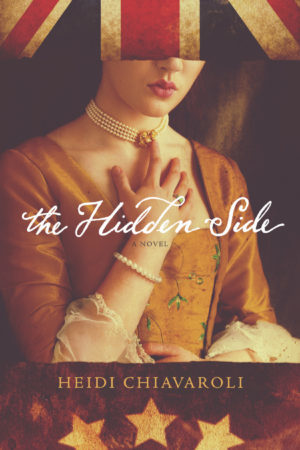
It seems that even after months of hard work and preparation, nothing can ever quite prepare me for this day—the day a book is born, the day it officially makes its way into the hands of readers. It is no longer mine, and that is a scary thought!
Is it horrible that I feel like I should slap a WARNING label on this book? (My marketing manager would probably advise against this!) But truly, if I were to write one, it would go something like this:
Do NOT open if you are looking for a sweet, comfortable read.
Do NOT open if you are looking for a bubbly romance.
Do NOT open if you don’t want to stretch yourself, if you don’t want to peer at life from outside what you may consider normal and safe.
DO open if you want to be challenged.
DO open if you are willing to go to the dark and difficult places to seek out growth and change.
DO open if you are willing to step outside comfort zones and explore the unknown.
DO open if you want to seek ultimate hope and light in the midst of the hopeless.
DO open if you are willing to have hard conversations with others.
DO open if you are willing to have your previous suppositions slain for the sake of growing in empathy and faith.
Okay, there it is. And perhaps it's a little lofty, but every single point hints at how this story pushed and changed me, even when I was dragging my feet about it. I'm trusting God to work in it how He will in the hearts of my readers.
Thank you, dear readers, for trusting me when you open this book. Thank you for coming alongside me on this journey. You all are an amazing blessing.
With love,
Heidi
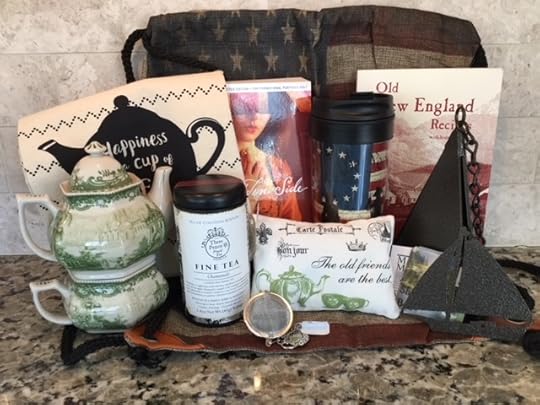
P.S. Would you like a chance to win this beautiful New England-inspired bundle of goodies? My publisher is helping me celebrate Release Day with this amazing giveaway! Click here to enter!
Subscribe to my RSS feed

Share this post
April 24, 2018
How the Mother of a School Shooter Helped Me Write The Hidden Side

If I'm going to be honest, I have to admit that I never thought I would write the title of this post. When I imagined all the stories that were before me to tell, The Hidden Side was not among them. Yet for reasons I write about here, this story did become mine to write.
This was scary, this realizing that I was actually going to go here and do this—step into what would probably be any mother’s worst nightmare. Even after my editor gave me the green light to write the story, I was in a bit of shock. I didn’t know how I’d get through it emotionally. And yet it was now my job to do so, and do so authentically.
Have you heard that famous writing rule, “Write what you know”? Well, I definitely broke it in writing The Hidden Side. Thankfully, I don’t know what it’s like to have a son who has committed such a terrible crime that he faces being locked away forever. But there are woman out there who know what this is like. Brave women. Women who have written their testimonies for others, like me, to glimpse not only their ordeals, but their hearts.
In my research, I discovered a particularly extreme example of what my character, Natalie, would be going through in the form of a memoir written by Sue Klebold. Sue is the mother of Dylan Klebold, one of the Columbine shooters.
I remember obtaining A Mother’s Reckoning from the library, bringing it home and putting it on my table, looking at the picture of an ordinary woman and her small son on the cover. Only this little boy wouldn’t grow up to have a career, maybe a family. In fact, the world would not know him for anything good he had done, but instead, he would be forever known for the pain he inflicted in the last hours before his death.
I did not want to go here. I did not, quite simply, want to relate to this woman. This woman who, at first glance, had raised a monster. Better to presume Dylan’s actions were some sort of parenting shortcoming. Safer to think that of course, my own children could never do anything nearly as terrible. My own children were loved, taught things of faith. I paid attention to them, to their interests, what they watched on television, who they hung out with, how they did in school. Safer to think that I was nothing like this woman who had birthed a boy capable of such travesty.
And then I read. Sue’s honesty and pain came through across the page. No, she wasn’t a perfect mother, but none of us can claim that. My heart ached for her, and in my reading I glimpsed the pain of my character, Natalie, whom I would need to write about.
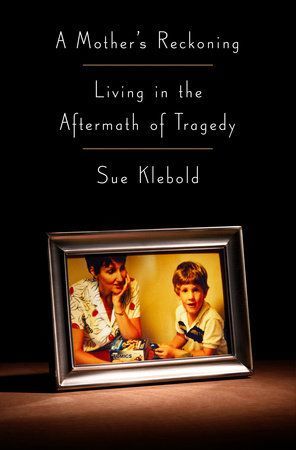
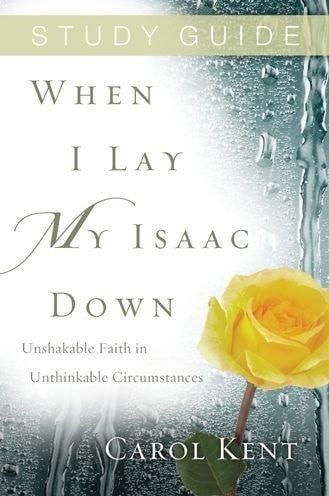
Another book I read that helped me understand some of what Natalie would be feeling was Carol Kent’s beautiful book, When I Lay My Isaac Down. Though not the mother of a school shooter, Carol’s son is serving a life sentence in jail. And yet her journey and her faith inspired me in the writing of The Hidden Side. It reminded me that God can, and often does, choose to work good out of the depths of darkness.
These books helped me grow in my humanity, my empathy, and my faith. They inspired me to write this story. I certainly don’t have all the answers to why these things happen. Plain and simple, humans often act wrongly. Sometimes very wrongly. Yet it was my desire to peel back the layers of things unseen—things we might not want to see…the hidden side, the gray area, of those difficult trials.
There is always the other side of the story. And though I often wish to curl up in my safe little world and refuse to peer into it, I am convinced that God is strong enough to work through the dark and despair, the bitterness and betrayal. He is strong enough and capable enough and simply enough to sustain us. That is the hope I wish to leave my readers with, that is the hope I have tried so very hard to portray in The Hidden Side. I look forward to hearing what you think!
Subscribe to my RSS feed

Share this post
April 10, 2018
Behind The Culper Spy Ring: Anna Smith Strong and Robert Townsend
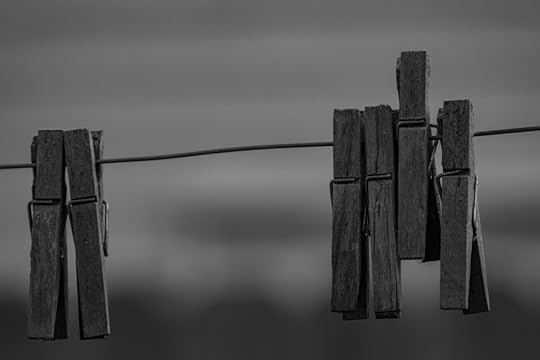
We're concluding our exploration of the Culper Spy Ring today by talking about the only female member of the ring, Anna Smith Strong, and the most elusive member of the ring, Robert Townsend.
Anna Smith Strong (aka Nancy Strong)
Born in 1740, Anna was a bit older than the other members of the spy ring. Mother of nine children and wife to Judge Selah Strong, Anna obtained permission to bring her husband food when he was arrested for "surreptitious correspondence with the enemy."
Anna's house was taken over by the occupying army, and she went to live in a slave cottage on her property.
A neighbor and good friend of Abraham Woodhull, much legend surrounds Anna Smith Strong. The legend says that Anna would hang a black petticoat on her laundry line, indicating that Caleb Brewster was nearby. The number of white handkerchiefs hung would indicate which cove (of the many in Setauket) that Caleb waited for Abraham in. (Or in other versions of the legend, which cove was safe for Caleb to enter, or where Abraham had left a dead drop.)
Anna is also said by many to be the mysterious Agent 355, "the lady" Abraham writes of in one of his letters, who would "outwit them all." Brian Kilmeade, in his book George Washington's Secret Six, however, says that "it seems quite unlikely that the fortyish housewife, mother, and spouse of a well-known Patriot rabble-rouser would have ventured from Long Island to Manhattan to attend parties where she would have rubbed elbows with the Loyalist elite and gained the trust of high-ranking British officers. A much more likely contender would be a young woman living a fashionable life in New York." This is where my fictional heroine, Mercy comes into play in The Hidden Side.
In Turn: In AMC's Turn, Anna is young and without children. She is disloyal to her husband and falls in love with Abraham Woodhull. I do, however, like her spunk and bravery portrayed in the series, and it is fun to think of the entire laundryline legend as being true—perhaps it is!
In The Hidden Side: Since Mercy takes up the role of Agent 355 in my book, we only have a brief scene with Anna. In my book, Anna never goes to Manhattan. That role is taken up by Mercy.
Robert Townsend
This historical character fascinates me. He kept his secret best, for it wasn't until the early 20th century that he was discovered as a member of the spy ring. Up until that time, it was a mystery how so much information was actually obtained in Manhattan. This is the man with the answers!
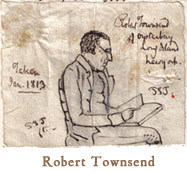
Recruited by Abraham Woodhull, this half Quaker/half Protestant had a share in James Rivington's Loyalist newspaper, the Royal Gazette. No one would guess that this simple, unassuming, cautious man would take up the business of spying.
A troubled man and lifelong bachelor, Robert seemed to be haunted by his duplicity, and yet the reading of Thomas Paine's Common Sense and his family's mistreatment by the redcoats in Oyster Bay prompted him to put aside his Loyalist leanings to aid General Washington.
In Turn: Robert is a tavern keeper, who takes part in Rivington's newspaper. He strikes me as a bit bolder than the real Robert Townsend, but that is to be expected. I have an inkling that the real Robert Townsend would not be one we think of as a television hero!
In The Hidden Side: I have tried to keep Robert's personality as true as I can to what history indicates. He is a major part of the story, but I can't say more for I don't want to give too much away. I will say I felt for Robert, for his very real struggle to do what was right, and for his fearfulness. I get that, so it was nice to try and portray the conflict faced by these spies. We often think of it as glorious, but there were certainly many inner challenges these men and women faced.
That completes our tour of the Culper Spy Ring! I hope you enjoyed learning about these members, and I hope you check out The Hidden Side soon!
Subscribe to my RSS feed

Share this post
March 27, 2018
Behind the Culper Spy Ring: Abraham Woodhull and Caleb Brewster
So glad you could join us as we continue our mini-series exploration of the Culper Spy Ring members, how they each play into the hit series Turn: Washington's Spies (AMC), and what part the members play in my upcoming release, The Hidden Side.
Today we're going to look at Abraham Woodhull and Caleb Brewster, two important members of the ring.
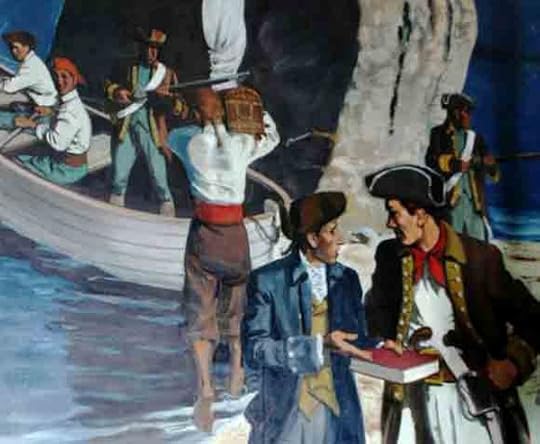
Abraham Woodhull, Code Name: Samuel Culper
Childhood friend and schoolmate of Benjamin Tallmadge, Abraham was fairly content to stay out of the politics raging through the colonies. He kept to himself for the most part, but living beneath the occupation of the King's Army must have bothered him, for he did take his friend Benjamin up on his offer to help General Washington obtain information.
No doubt Major Tallmadge turned to Abraham because they already shared a bond of trust. Spying was not an honorable business, and in a field where double agents abounded, Benjamin would have wanted someone he could trust— someone who already had an excuse for being in enemy-occupied Manhattan.
(Photo above from American Gallery by Vance Locke. Depicts Abraham Woodhull (left) and Caleb Brewster exchanging information. I love how Locke conveys their unique personalities so well in the painting.)
Abraham was an unmarried farmer at the time of the Revolution. He was small and frail. His older brother had died, and Abraham had taken over the family farm, two ailing parents and two sisters depending on him.
So why did Abraham choose to risk so much?
We're not sure, but certainly there are some important considerations to give us a clue or two. Remember, the Long Islanders had been living beneath the King's Army for nearly two years now. The soldiers lived in their houses, took their beds and fuel and food as they saw fit. Certainly Abraham's farm had seen its fair share of harm done by the occupation.
The death of his cousin, General Nathaniel Woodhull, may have been another reason for his espionage activities. Nathaniel had fought at the Battle of Long Island, but was later mistreated by the King's Army and left to languish, abused, in a prison weeks before he finally died.
Certainly these are adequate motivation for Abraham, but being asked by one of his closest friends to help General Washington? Abraham no doubt thought it a worthy way to contribute to the freedom of the colonies.
Already making regular trips to Manhattan to bring food to the army, Abraham also had a sister who owned a boardinghouse in the city with her husband. He had plenty of reason for being in the city. Why not try to help the cause of the Continental Army while he was at it?
In TURN: I appreciate Abraham's character in TURN. I have a feeling he's portrayed with a bit more courage than he actually may have had (which makes the show all the more exciting!). In TURN, he is often at odds with his father, who is a Loyalist. There is no evidence of this in actual history, but it contributes to the conflict and tension of the show. Another conflict that TURN introduces is a marriage and child, and intense feelings of Abraham for Anna Smith Strong (more to come on her in a later post). In actuality, Abraham did not marry until nearly the end of the war, and there is no evidence that Anna was ever more to him than a neighbor.
In The Hidden Side: I have tried to remain as true as I could to Abraham's actual character. In my book, Abraham is good friends with my historical heroine, Mercy Howard. Mercy feels guilt over her Uncle's role in leading General Howe through Jamaica Pass to successfully defeat General Nathaniel Woodhull in the Battle of Brooklyn.
(Photo to the right is courtesy of Three Village Historical Society.)
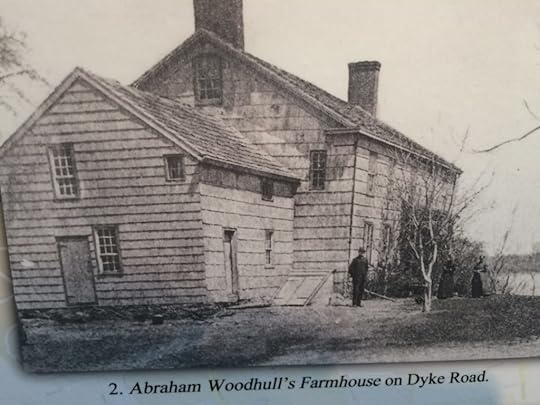
Caleb Brewster
Another childhood friend of Benjamin and Abraham, this fierce man was a former whaleboatman who was said to have a quick wit and a rather rude sense of humor. It was likely he who took Abraham's messages of intelligence across the Sound to Patriot-occupied Connecticut.
Interestingly, he was the only member of the ring who refused to take an alias. He was also one of the first who spoke about his espionage role in the war after it was over.
In TURN: As far as I can tell, it seems this character is one that is played incredibly close to his actual role in history. The writers of TURN show Caleb as he was—bold, daring, lively, and willing to go to great lengths, not only for his friends, but for the freedom of the colonies from oppression by the redcoats.
In The Hidden Side: Alas, as much as I love Caleb's feisty personality, he is only mentioned in passing in my story. My contemporary characters, however, live on a real street named after him called Brewster Court in East Setauket, NY.
This post uses Affiliate Links. Thank you for using our links!
Subscribe to my RSS feed

Share this post
March 13, 2018
Behind the Culper Spy Ring Members: George Washington and Benjamin Tallmadge
The Culper Spy Ring plays a major part in my upcoming release, The Hidden Side. I thought it would be fun to explore this Revolutionary spy ring, made even more popular by AMC's series TURN: Washington's Spies, based on the book by Alexander Rose.
Join me over the next few posts as I explore those who made up the Ring, comparing the actual historical people with those in TURN, and finally, sharing a bit of their place in The Hidden Side.
"There is nothing more necessary than good intelligence to frustrate a designing enemy and nothing requires greater pains to obtain."
~ George Washington
The father of intelligence, George Washington organized several spy operations during the Revolution. The Culper Spy Ring would become his most well-known and successful. A veteran of the French and Indian War, Washington himself had infiltrated enemy lines to gather information on the enemy's plans, positions, and movements.
Years later, after defeat at the Battle of Brooklyn and the loss of New York City to the King's Army, General George Washington sought to plant a man behind enemy lines to obtain not only accurate, but timely (there were no cell phones back then!) information. He turned to Nathan Hale, but this mission ended in tragedy.
After Hale's demise, George Washington changed tactics. He knew if he was to obtain much-needed information, he had to use men and women who already had a reason for being behind enemy lines.
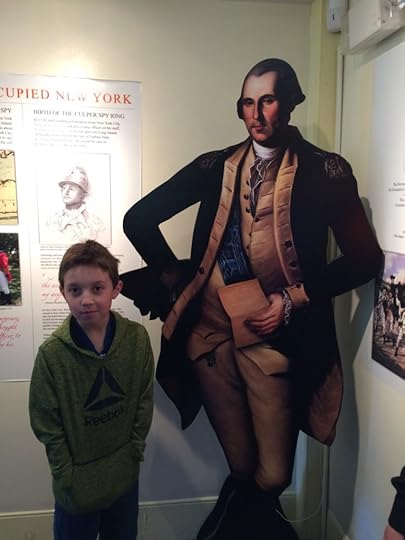
In TURN: I love the portrayal of George Washington in this series! They do a wonderful job of creating the man behind so much Patriot success. I particularly like how they give him a very human side, giving him flaws where we often imagine a completely perfect hero.
(The picture above is Noah beside a life-size Washington, courtesy of Three Village Historical Society in Setauket, NY.)
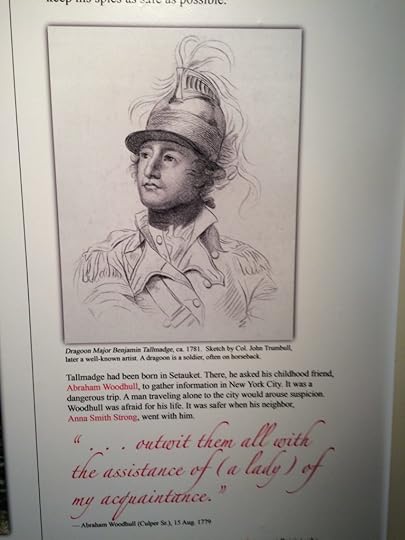
Benjamin Tallmadge, Head of the Revolutionary CIA
The son of the minister of Setauket Presbyterian Church, Benjamin Tallmadge entered school at the young age of six, already fluent in Latin. When he attended Yale several years later, he became close friends with Nathan Hale. Benjamin, who encouraged his friend to join the Continental Army, likely felt some guilt over Nathan's unfortunate demise.
Together with General Washington, Benjamin turned to his childhood friends--Abraham Woodhull, Caleb Brewster, Austin Roe, and Anna Smith Strong. He'd grown up with them. He trusted them. And, being situated on Long Island, they were in a perfect position to take trips to Manhattan (more on this in Abraham's upcoming post) and bring information back to their hometown of Setauket to be whisked across the Sound to Patriot-occupied Connecticut.
(Photo at left is courtesy of The Three Village Historical Society.)
In TURN: Another dynamic character! I love how the series grounds Tallmadge in his real historical character (as much as possible). In the series, Benjamin convinces his friend Abraham to aid Washington, as he did in real life. As any good television drama has to do, they give him a passing love interest not recorded in history, but this only made him more real to me. (Can you tell I'm a BIG fan of this show?)
In The Hidden Side: While Benjamin Tallmadge doesn't play a major role in my novel, he is the means through which my historical heroine, Mercy, meets her fiancé, Nathan Hale. And of course, Benjamin is mentioned throughout as the catalyst that spurs the Culper Spy Ring (and Mercy) into action.
(Photo to the right is courtesy of The Three Village Historical Society.)
Join me next time as we explore more real historical Spy Ring members found in The Hidden Side!

This post uses Affiliate Links. We are a participant in the Amazon Associates Program. Thank you for using our links!
Subscribe to my RSS feed

Share this post



